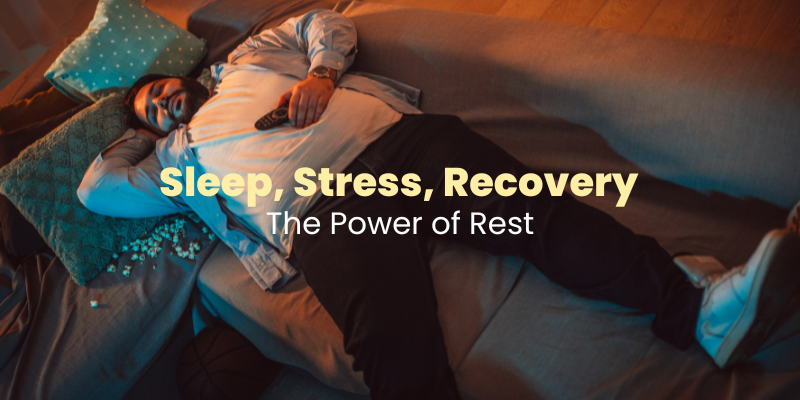Sleep, Stress, Recovery: The Power of Rest in Your Fitness Journey
Many individuals think about diet and exercise when they want to lose weight. Even though those are essential, getting enough sleep and recovering are just as vital to getting and keeping results. In addition to improving performance, taking care of your body during sleep encourages long-term health and well-being.
🌟 Prioritise Quality Sleep (7-8 Hours)
Sleep is more than just rest; it's a powerful tool for weight loss and recovery. When you get enough sleep, your body regulates hunger hormones, preventing overeating and reducing cravings. It also promotes muscle repair following exercise, ensuring your body is ready to go the following day. A good night's sleep boosts mood, improves concentration, and quickens the metabolism.
To improve the quality of your sleep, try to sleep between seven and eight hours each night. To encourage deep sleep, cut down on screen time before bed, establish a calming bedtime routine, and make sure your room is quiet, dark, and cool.
🌳 Manage Stress to Prevent Emotional Eating
Long-term stress can hinder weight loss by increasing cortisol levels, which can lead to fat storage and increased cravings for unhealthy foods. High levels of stress often lead to emotional eating, which makes it harder to keep up with healthy eating habits.
Implementing daily methods that decrease stress can make an enormous impact. Deep breathing, mindfulness, and meditation are all helpful for promoting mental relaxation. Stress can also be reduced by doing light activities like yoga, stretching, or taking a quick walk outside. Prioritise making time to relax, slow down, and create quiet moments.
🏋️ Take Rest Days to Rebuild & Recharge
Your body grows stronger during rest, not while you’re training. Rest days are crucial for preventing injuries, repairing muscles, and recovery. You run the risk of overtraining, burnout, and setbacks if you don't recover enough.
Schedule both active recovery days with light exercises like stretching, foam rolling, or walking, as well as full rest days where you can unwind completely. This balance encourages circulation and healing by allowing your body to heal while remaining lightly active.
📊 Hydration, Nutrition & Gentle Movement
Recovery isn’t just about resting; it's also about nourishing your body the right way. Maintaining proper hydration is important for contracting muscles, detoxification, and general recuperation. Food high in nutrients, like green vegetables, lean meats, and healthy fats, aid in the body's renewal and repair.
Even on days off, incorporating small movements can help to improve blood flow, ease tense muscles, and support a strain-free recovery. A few exercises you easily incorporate are: swimming, mobility exercises, and leisurely walks.
Recovery is Essential
It's not a sign of laziness but rather where real transformation happens. By prioritising your sleep, you can help manage stress and allow your body time to heal for more consistent fat loss, fewer injuries, and better overall health.
With a balanced approach that honors both movement and rest, you set yourself up for long-term success. Take care of your body not only when you're pushing hard but also when you're stepping back to recover.






